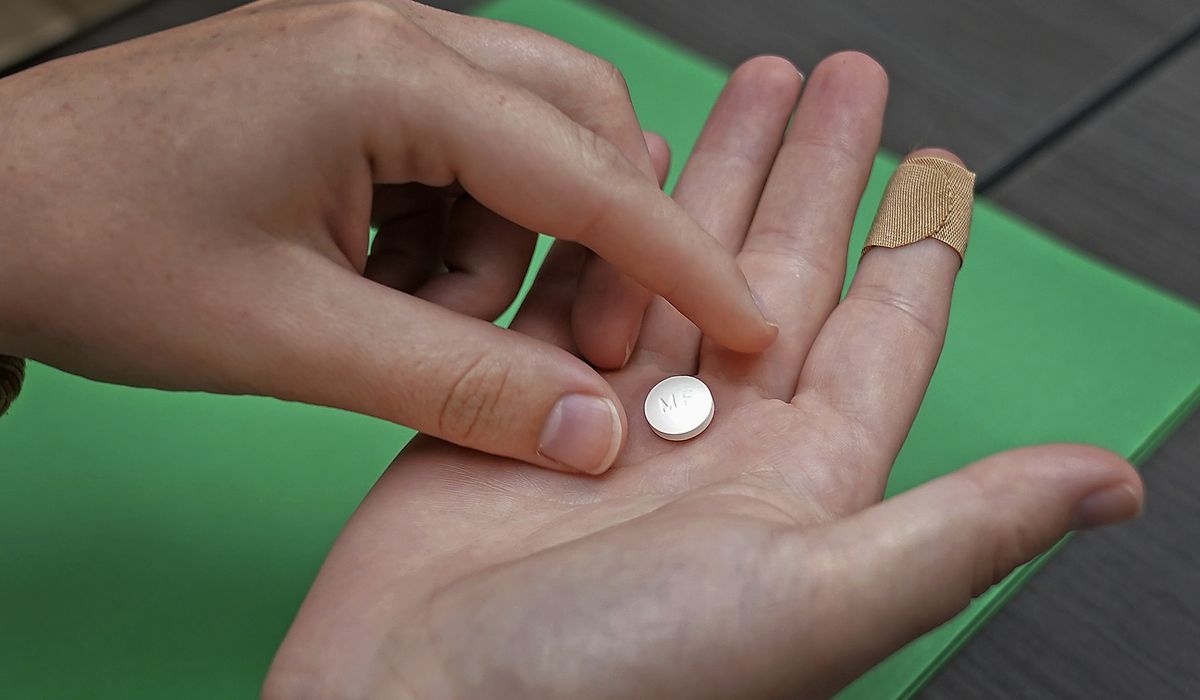


A federal appeals court ruled Wednesday that the abortion pill can remain on the market, though the judges halted recent moves to expand access, such as the Biden administration’s plan to make it available to women through the mail.
The 5th U.S. Circuit Court of Appeals said too much time has elapsed to revisit the Food and Drug Administration’s original 2000 certification of the pill, mifepristone.
But the three-judge panel issued an injunction blocking some of the changes made in 2016 and later that relaxed the rules on access to the pill, ruling the agency cut too many corners.
Among those changes were allowing non-doctors to prescribe the pill, raising the maximum gestational age for use to 10 weeks and canceling the need for an in-person follow-up visit, all made by the Obama administration, and the mail option, which was enacted by the Biden administration.
“In loosening mifepristone’s safety restrictions, FDA failed to address several important concerns about whether the drug would be safe for the women who use it,” said Jennifer Walker Elrod, a Bush appointee, in the court’s chief opinion.
The ruling is on hold under a previous order of the Supreme Court, which now may be asked to take the case.
Mifepristone has become a major battleground in abortion politics since its approval by the Clinton administration.
It blocks the hormone progesterone, which is required for a pregnancy to continue. Another drug, misoprostol, is then administered to expel the contents of the uterus.
The drug has marked a revolution in abortion, with medication abortions now accounting for more than half of all abortions.
Pro-life activists contend that medication abortions are inherently risky and leave women without the kind of care they would get for an in-person procedure.
Pro-life doctors brought the court challenge, saying the original 2000 certification was wrong, as well as subsequent moves to expand access.
The Biden administration and Danco Laboratories, the original manufacturer, fought the challenge.
U.S. District Judge Matthew Kacsmaryk, a Trump appointee, sided with the pro-life doctors, saying the FDA sidestepped too much science and “acquiesced on its legitimate safety concerns — in violation of its statutory duty — based on plainly unsound reasoning and studies that did not support its conclusions.”
The Supreme Court stepped in and allowed the drug’s certification, and the subsequent rules changes, to remain in effect while the case is winding its way through higher courts.
The Biden administration says prohibiting the pill undermines science and is creating chaos in the courts.
Officials pointed to a separate district court in Washington state that upheld the FDA’s decisions on mifepristone.
In Wednesday’s appeals court ruling, all three judges ruled that the Obama and Biden administration moves to expand access were too hasty.
The court said that while the FDA considered each of the changes separately, it failed to consider the cumulative effects and whether that would alter the risks to women. It also didn’t gather enough evidence to show mifepristone could be safely used without an in-person doctor’s visit.
One member of the panel, Judge James Ho, said he would have gone further and upheld Judge Kacsmaryk’s injunction against the original 2000 certification.
The Trump appointee detailed a series of previous bungles by the FDA in urging a strict adherence to federal laws governing the approval of medications.
“Scientists have contributed an enormous amount to improving our lives. But scientists are human beings just like the rest of us. They’re not perfect,” he wrote. “None of us are. We all make mistakes. And the FDA has made plenty.”
The court’s decision came a year after the Supreme Court overturned the 1973 Roe decision that had established a national right to abortion. In a 5-4 ruling, the justices returned the issue to the states.
The Biden administration first approved delivering the abortion pill by mail in 2021, amid the COVID-19 pandemic. It finalized that rule this year, in what backers hoped could be a workaround for women in states with restrictive abortion laws.
Dr. Ingrid Skop, a Texas-based OB-GYN whose testimony featured prominently in the judges’ ruling, said Wednesday that the ruling could protect women.
“Those promoting unsupervised DIY abortion pills clearly prioritize the deaths of unborn children over the health and safety of women,” she said. “I hope the FDA will once and for all be held accountable to its task of protecting the American public from this dangerous drug.”
But Sen. Ron Wyden, Oregon Democrat, lashed out at the court, calling the ruling “a political ploy to control women’s bodies.”
“The science is clear and a wealth of evidence demonstrates the drug’s safety and efficacy, which is why the FDA approved it more than 20 years ago. In fact, mifepristone has fewer complications than Tylenol,” he said.
• Stephen Dinan can be reached at sdinan@washingtontimes.com.
• Alex Swoyer can be reached at aswoyer@washingtontimes.com.
